Reflective Report: Employability Skills and CSR in Business Studies
VerifiedAdded on 2023/01/13
|7
|2013
|34
Report
AI Summary
This report delves into the significance of employability skills and corporate social responsibility (CSR) within a business context. It explores how participating in CSR initiatives contributes to the development of essential skills such as communication, problem-solving, teamwork, research, time management, and information technology skills. The report utilizes Gibbs' reflective cycle to analyze personal experiences and learnings related to a marketing campaign conducted as part of a CSR project. The analysis covers descriptions of events, emotional responses, evaluations of outcomes, identification of factors that influenced the events, conclusions drawn from the experiences, and the formulation of action plans for future engagements. The conclusion emphasizes the importance of possessing a range of skills for professional success, the benefits of CSR for organizational image and market competitiveness, and the value of proactive planning and adaptability in managing challenges. The report aims to provide insights into the practical application of employability skills and the role of CSR in fostering these skills, offering valuable lessons for students and professionals alike. This assignment is contributed by a student to be published on the website Desklib, a platform which provides all the necessary AI based study tools for students.
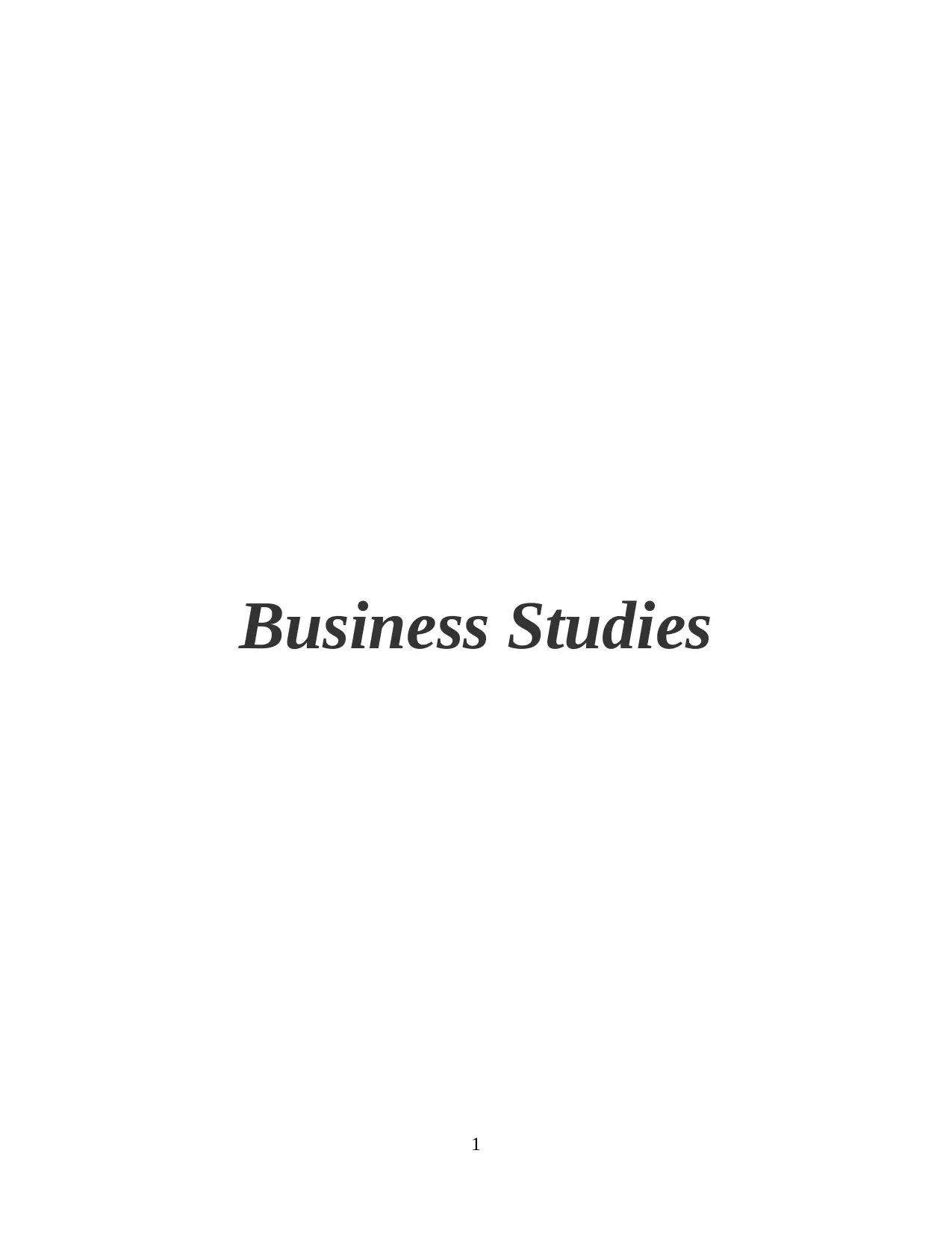
Business Studies
1
1
Paraphrase This Document
Need a fresh take? Get an instant paraphrase of this document with our AI Paraphraser
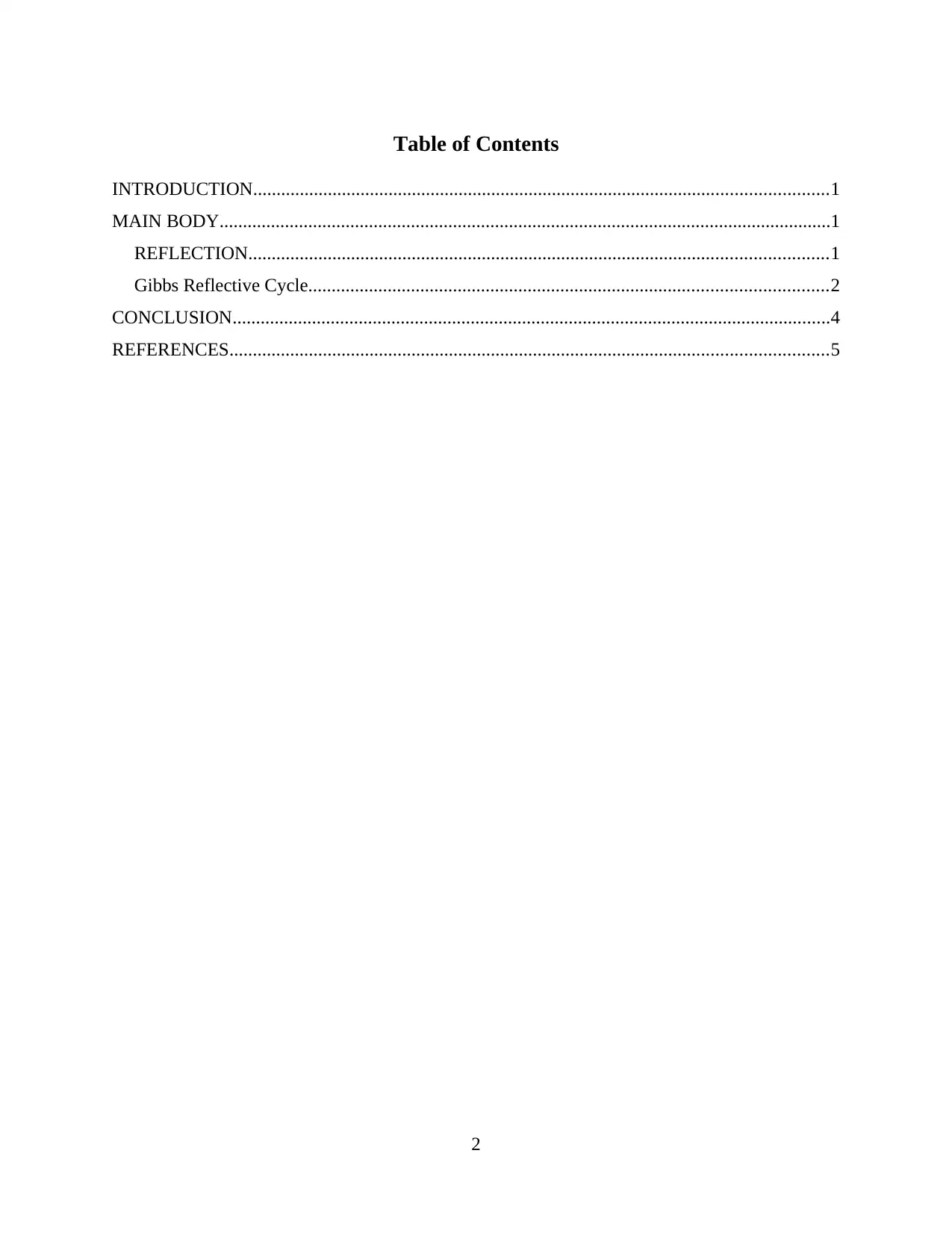
Table of Contents
INTRODUCTION...........................................................................................................................1
MAIN BODY...................................................................................................................................1
REFLECTION............................................................................................................................1
Gibbs Reflective Cycle...............................................................................................................2
CONCLUSION................................................................................................................................4
REFERENCES................................................................................................................................5
2
INTRODUCTION...........................................................................................................................1
MAIN BODY...................................................................................................................................1
REFLECTION............................................................................................................................1
Gibbs Reflective Cycle...............................................................................................................2
CONCLUSION................................................................................................................................4
REFERENCES................................................................................................................................5
2
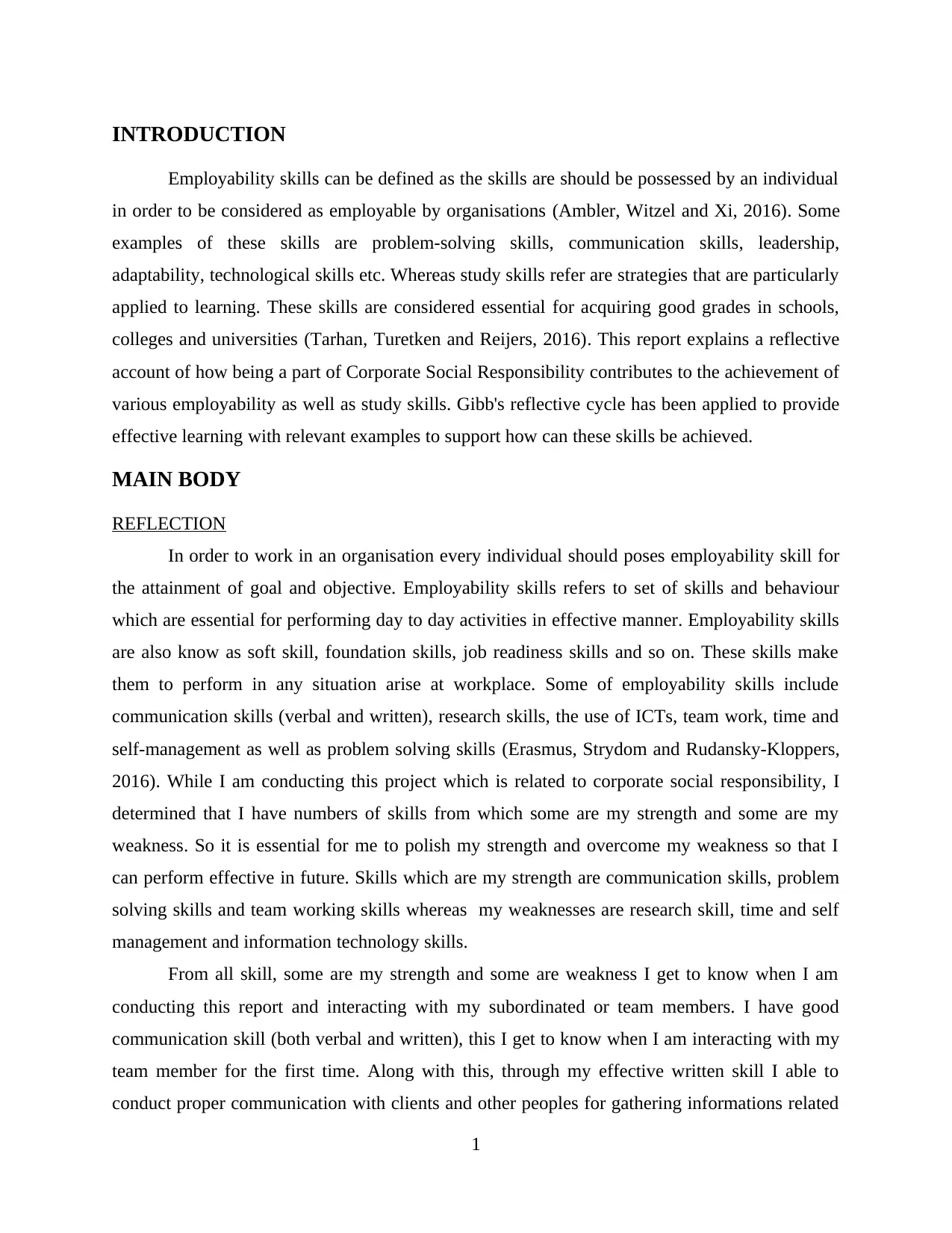
INTRODUCTION
Employability skills can be defined as the skills are should be possessed by an individual
in order to be considered as employable by organisations (Ambler, Witzel and Xi, 2016). Some
examples of these skills are problem-solving skills, communication skills, leadership,
adaptability, technological skills etc. Whereas study skills refer are strategies that are particularly
applied to learning. These skills are considered essential for acquiring good grades in schools,
colleges and universities (Tarhan, Turetken and Reijers, 2016). This report explains a reflective
account of how being a part of Corporate Social Responsibility contributes to the achievement of
various employability as well as study skills. Gibb's reflective cycle has been applied to provide
effective learning with relevant examples to support how can these skills be achieved.
MAIN BODY
REFLECTION
In order to work in an organisation every individual should poses employability skill for
the attainment of goal and objective. Employability skills refers to set of skills and behaviour
which are essential for performing day to day activities in effective manner. Employability skills
are also know as soft skill, foundation skills, job readiness skills and so on. These skills make
them to perform in any situation arise at workplace. Some of employability skills include
communication skills (verbal and written), research skills, the use of ICTs, team work, time and
self-management as well as problem solving skills (Erasmus, Strydom and Rudansky-Kloppers,
2016). While I am conducting this project which is related to corporate social responsibility, I
determined that I have numbers of skills from which some are my strength and some are my
weakness. So it is essential for me to polish my strength and overcome my weakness so that I
can perform effective in future. Skills which are my strength are communication skills, problem
solving skills and team working skills whereas my weaknesses are research skill, time and self
management and information technology skills.
From all skill, some are my strength and some are weakness I get to know when I am
conducting this report and interacting with my subordinated or team members. I have good
communication skill (both verbal and written), this I get to know when I am interacting with my
team member for the first time. Along with this, through my effective written skill I able to
conduct proper communication with clients and other peoples for gathering informations related
1
Employability skills can be defined as the skills are should be possessed by an individual
in order to be considered as employable by organisations (Ambler, Witzel and Xi, 2016). Some
examples of these skills are problem-solving skills, communication skills, leadership,
adaptability, technological skills etc. Whereas study skills refer are strategies that are particularly
applied to learning. These skills are considered essential for acquiring good grades in schools,
colleges and universities (Tarhan, Turetken and Reijers, 2016). This report explains a reflective
account of how being a part of Corporate Social Responsibility contributes to the achievement of
various employability as well as study skills. Gibb's reflective cycle has been applied to provide
effective learning with relevant examples to support how can these skills be achieved.
MAIN BODY
REFLECTION
In order to work in an organisation every individual should poses employability skill for
the attainment of goal and objective. Employability skills refers to set of skills and behaviour
which are essential for performing day to day activities in effective manner. Employability skills
are also know as soft skill, foundation skills, job readiness skills and so on. These skills make
them to perform in any situation arise at workplace. Some of employability skills include
communication skills (verbal and written), research skills, the use of ICTs, team work, time and
self-management as well as problem solving skills (Erasmus, Strydom and Rudansky-Kloppers,
2016). While I am conducting this project which is related to corporate social responsibility, I
determined that I have numbers of skills from which some are my strength and some are my
weakness. So it is essential for me to polish my strength and overcome my weakness so that I
can perform effective in future. Skills which are my strength are communication skills, problem
solving skills and team working skills whereas my weaknesses are research skill, time and self
management and information technology skills.
From all skill, some are my strength and some are weakness I get to know when I am
conducting this report and interacting with my subordinated or team members. I have good
communication skill (both verbal and written), this I get to know when I am interacting with my
team member for the first time. Along with this, through my effective written skill I able to
conduct proper communication with clients and other peoples for gathering informations related
1
⊘ This is a preview!⊘
Do you want full access?
Subscribe today to unlock all pages.

Trusted by 1+ million students worldwide
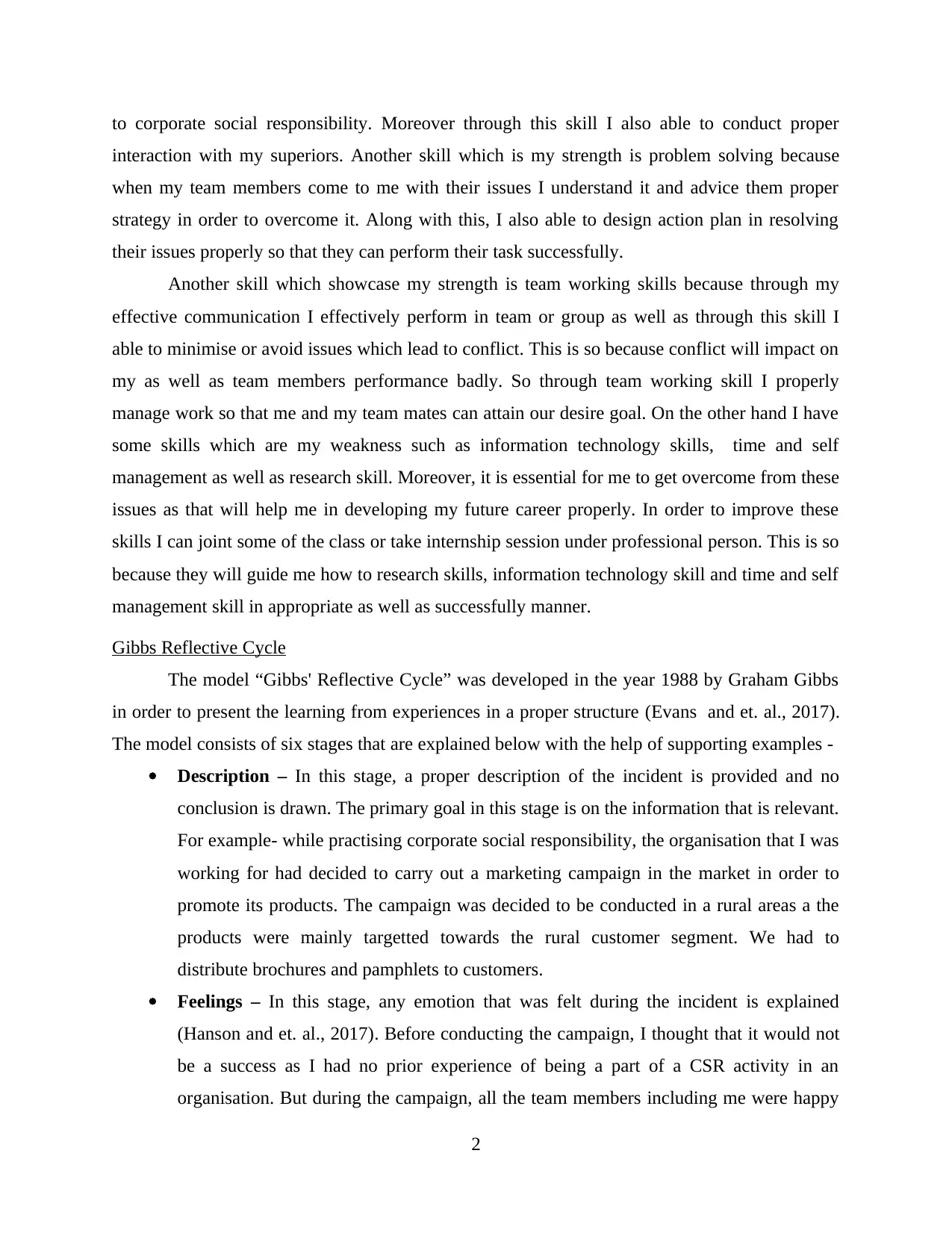
to corporate social responsibility. Moreover through this skill I also able to conduct proper
interaction with my superiors. Another skill which is my strength is problem solving because
when my team members come to me with their issues I understand it and advice them proper
strategy in order to overcome it. Along with this, I also able to design action plan in resolving
their issues properly so that they can perform their task successfully.
Another skill which showcase my strength is team working skills because through my
effective communication I effectively perform in team or group as well as through this skill I
able to minimise or avoid issues which lead to conflict. This is so because conflict will impact on
my as well as team members performance badly. So through team working skill I properly
manage work so that me and my team mates can attain our desire goal. On the other hand I have
some skills which are my weakness such as information technology skills, time and self
management as well as research skill. Moreover, it is essential for me to get overcome from these
issues as that will help me in developing my future career properly. In order to improve these
skills I can joint some of the class or take internship session under professional person. This is so
because they will guide me how to research skills, information technology skill and time and self
management skill in appropriate as well as successfully manner.
Gibbs Reflective Cycle
The model “Gibbs' Reflective Cycle” was developed in the year 1988 by Graham Gibbs
in order to present the learning from experiences in a proper structure (Evans and et. al., 2017).
The model consists of six stages that are explained below with the help of supporting examples -
Description – In this stage, a proper description of the incident is provided and no
conclusion is drawn. The primary goal in this stage is on the information that is relevant.
For example- while practising corporate social responsibility, the organisation that I was
working for had decided to carry out a marketing campaign in the market in order to
promote its products. The campaign was decided to be conducted in a rural areas a the
products were mainly targetted towards the rural customer segment. We had to
distribute brochures and pamphlets to customers.
Feelings – In this stage, any emotion that was felt during the incident is explained
(Hanson and et. al., 2017). Before conducting the campaign, I thought that it would not
be a success as I had no prior experience of being a part of a CSR activity in an
organisation. But during the campaign, all the team members including me were happy
2
interaction with my superiors. Another skill which is my strength is problem solving because
when my team members come to me with their issues I understand it and advice them proper
strategy in order to overcome it. Along with this, I also able to design action plan in resolving
their issues properly so that they can perform their task successfully.
Another skill which showcase my strength is team working skills because through my
effective communication I effectively perform in team or group as well as through this skill I
able to minimise or avoid issues which lead to conflict. This is so because conflict will impact on
my as well as team members performance badly. So through team working skill I properly
manage work so that me and my team mates can attain our desire goal. On the other hand I have
some skills which are my weakness such as information technology skills, time and self
management as well as research skill. Moreover, it is essential for me to get overcome from these
issues as that will help me in developing my future career properly. In order to improve these
skills I can joint some of the class or take internship session under professional person. This is so
because they will guide me how to research skills, information technology skill and time and self
management skill in appropriate as well as successfully manner.
Gibbs Reflective Cycle
The model “Gibbs' Reflective Cycle” was developed in the year 1988 by Graham Gibbs
in order to present the learning from experiences in a proper structure (Evans and et. al., 2017).
The model consists of six stages that are explained below with the help of supporting examples -
Description – In this stage, a proper description of the incident is provided and no
conclusion is drawn. The primary goal in this stage is on the information that is relevant.
For example- while practising corporate social responsibility, the organisation that I was
working for had decided to carry out a marketing campaign in the market in order to
promote its products. The campaign was decided to be conducted in a rural areas a the
products were mainly targetted towards the rural customer segment. We had to
distribute brochures and pamphlets to customers.
Feelings – In this stage, any emotion that was felt during the incident is explained
(Hanson and et. al., 2017). Before conducting the campaign, I thought that it would not
be a success as I had no prior experience of being a part of a CSR activity in an
organisation. But during the campaign, all the team members including me were happy
2
Paraphrase This Document
Need a fresh take? Get an instant paraphrase of this document with our AI Paraphraser
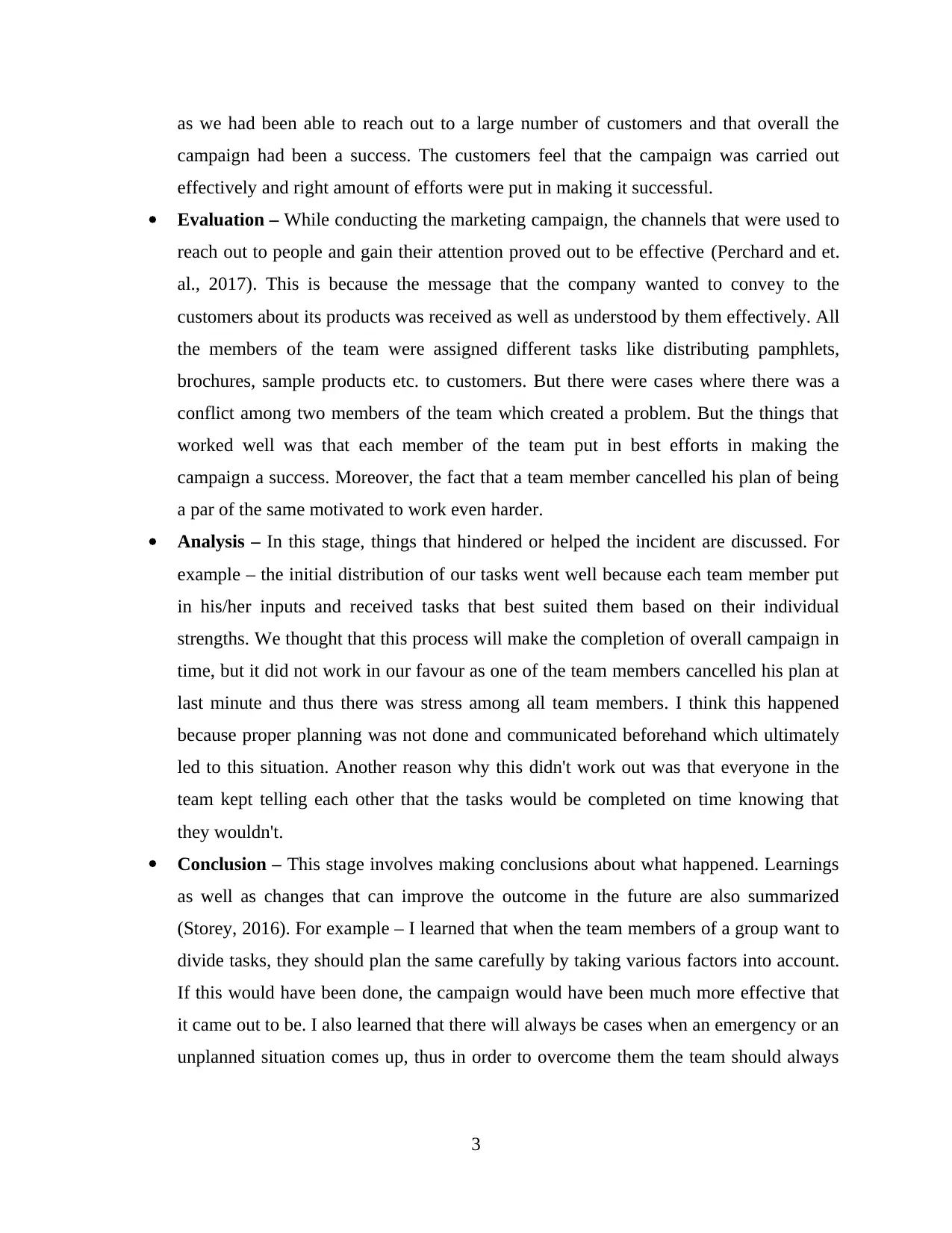
as we had been able to reach out to a large number of customers and that overall the
campaign had been a success. The customers feel that the campaign was carried out
effectively and right amount of efforts were put in making it successful.
Evaluation – While conducting the marketing campaign, the channels that were used to
reach out to people and gain their attention proved out to be effective (Perchard and et.
al., 2017). This is because the message that the company wanted to convey to the
customers about its products was received as well as understood by them effectively. All
the members of the team were assigned different tasks like distributing pamphlets,
brochures, sample products etc. to customers. But there were cases where there was a
conflict among two members of the team which created a problem. But the things that
worked well was that each member of the team put in best efforts in making the
campaign a success. Moreover, the fact that a team member cancelled his plan of being
a par of the same motivated to work even harder.
Analysis – In this stage, things that hindered or helped the incident are discussed. For
example – the initial distribution of our tasks went well because each team member put
in his/her inputs and received tasks that best suited them based on their individual
strengths. We thought that this process will make the completion of overall campaign in
time, but it did not work in our favour as one of the team members cancelled his plan at
last minute and thus there was stress among all team members. I think this happened
because proper planning was not done and communicated beforehand which ultimately
led to this situation. Another reason why this didn't work out was that everyone in the
team kept telling each other that the tasks would be completed on time knowing that
they wouldn't.
Conclusion – This stage involves making conclusions about what happened. Learnings
as well as changes that can improve the outcome in the future are also summarized
(Storey, 2016). For example – I learned that when the team members of a group want to
divide tasks, they should plan the same carefully by taking various factors into account.
If this would have been done, the campaign would have been much more effective that
it came out to be. I also learned that there will always be cases when an emergency or an
unplanned situation comes up, thus in order to overcome them the team should always
3
campaign had been a success. The customers feel that the campaign was carried out
effectively and right amount of efforts were put in making it successful.
Evaluation – While conducting the marketing campaign, the channels that were used to
reach out to people and gain their attention proved out to be effective (Perchard and et.
al., 2017). This is because the message that the company wanted to convey to the
customers about its products was received as well as understood by them effectively. All
the members of the team were assigned different tasks like distributing pamphlets,
brochures, sample products etc. to customers. But there were cases where there was a
conflict among two members of the team which created a problem. But the things that
worked well was that each member of the team put in best efforts in making the
campaign a success. Moreover, the fact that a team member cancelled his plan of being
a par of the same motivated to work even harder.
Analysis – In this stage, things that hindered or helped the incident are discussed. For
example – the initial distribution of our tasks went well because each team member put
in his/her inputs and received tasks that best suited them based on their individual
strengths. We thought that this process will make the completion of overall campaign in
time, but it did not work in our favour as one of the team members cancelled his plan at
last minute and thus there was stress among all team members. I think this happened
because proper planning was not done and communicated beforehand which ultimately
led to this situation. Another reason why this didn't work out was that everyone in the
team kept telling each other that the tasks would be completed on time knowing that
they wouldn't.
Conclusion – This stage involves making conclusions about what happened. Learnings
as well as changes that can improve the outcome in the future are also summarized
(Storey, 2016). For example – I learned that when the team members of a group want to
divide tasks, they should plan the same carefully by taking various factors into account.
If this would have been done, the campaign would have been much more effective that
it came out to be. I also learned that there will always be cases when an emergency or an
unplanned situation comes up, thus in order to overcome them the team should always
3
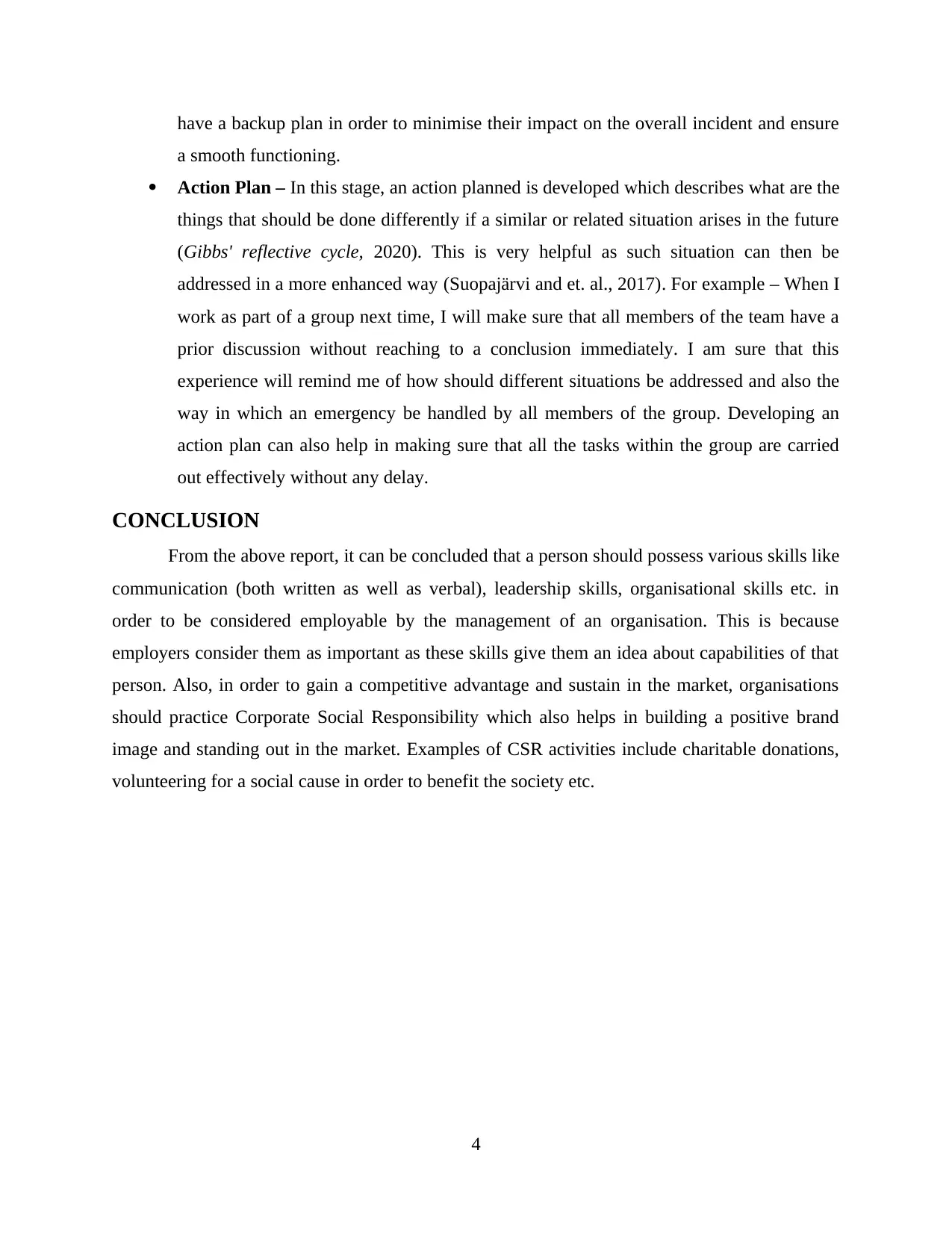
have a backup plan in order to minimise their impact on the overall incident and ensure
a smooth functioning.
Action Plan – In this stage, an action planned is developed which describes what are the
things that should be done differently if a similar or related situation arises in the future
(Gibbs' reflective cycle, 2020). This is very helpful as such situation can then be
addressed in a more enhanced way (Suopajärvi and et. al., 2017). For example – When I
work as part of a group next time, I will make sure that all members of the team have a
prior discussion without reaching to a conclusion immediately. I am sure that this
experience will remind me of how should different situations be addressed and also the
way in which an emergency be handled by all members of the group. Developing an
action plan can also help in making sure that all the tasks within the group are carried
out effectively without any delay.
CONCLUSION
From the above report, it can be concluded that a person should possess various skills like
communication (both written as well as verbal), leadership skills, organisational skills etc. in
order to be considered employable by the management of an organisation. This is because
employers consider them as important as these skills give them an idea about capabilities of that
person. Also, in order to gain a competitive advantage and sustain in the market, organisations
should practice Corporate Social Responsibility which also helps in building a positive brand
image and standing out in the market. Examples of CSR activities include charitable donations,
volunteering for a social cause in order to benefit the society etc.
4
a smooth functioning.
Action Plan – In this stage, an action planned is developed which describes what are the
things that should be done differently if a similar or related situation arises in the future
(Gibbs' reflective cycle, 2020). This is very helpful as such situation can then be
addressed in a more enhanced way (Suopajärvi and et. al., 2017). For example – When I
work as part of a group next time, I will make sure that all members of the team have a
prior discussion without reaching to a conclusion immediately. I am sure that this
experience will remind me of how should different situations be addressed and also the
way in which an emergency be handled by all members of the group. Developing an
action plan can also help in making sure that all the tasks within the group are carried
out effectively without any delay.
CONCLUSION
From the above report, it can be concluded that a person should possess various skills like
communication (both written as well as verbal), leadership skills, organisational skills etc. in
order to be considered employable by the management of an organisation. This is because
employers consider them as important as these skills give them an idea about capabilities of that
person. Also, in order to gain a competitive advantage and sustain in the market, organisations
should practice Corporate Social Responsibility which also helps in building a positive brand
image and standing out in the market. Examples of CSR activities include charitable donations,
volunteering for a social cause in order to benefit the society etc.
4
⊘ This is a preview!⊘
Do you want full access?
Subscribe today to unlock all pages.

Trusted by 1+ million students worldwide
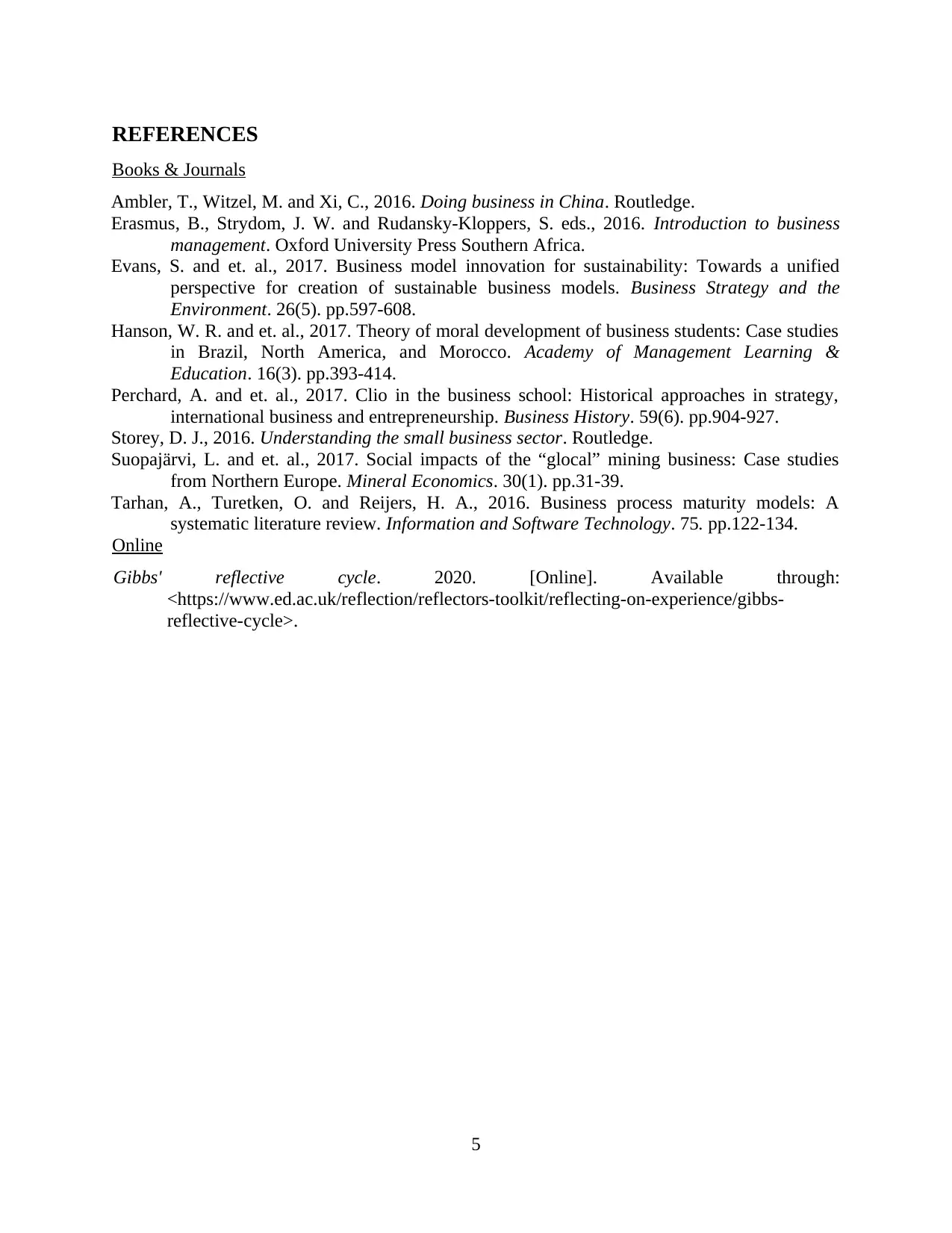
REFERENCES
Books & Journals
Ambler, T., Witzel, M. and Xi, C., 2016. Doing business in China. Routledge.
Erasmus, B., Strydom, J. W. and Rudansky-Kloppers, S. eds., 2016. Introduction to business
management. Oxford University Press Southern Africa.
Evans, S. and et. al., 2017. Business model innovation for sustainability: Towards a unified
perspective for creation of sustainable business models. Business Strategy and the
Environment. 26(5). pp.597-608.
Hanson, W. R. and et. al., 2017. Theory of moral development of business students: Case studies
in Brazil, North America, and Morocco. Academy of Management Learning &
Education. 16(3). pp.393-414.
Perchard, A. and et. al., 2017. Clio in the business school: Historical approaches in strategy,
international business and entrepreneurship. Business History. 59(6). pp.904-927.
Storey, D. J., 2016. Understanding the small business sector. Routledge.
Suopajärvi, L. and et. al., 2017. Social impacts of the “glocal” mining business: Case studies
from Northern Europe. Mineral Economics. 30(1). pp.31-39.
Tarhan, A., Turetken, O. and Reijers, H. A., 2016. Business process maturity models: A
systematic literature review. Information and Software Technology. 75. pp.122-134.
Online
Gibbs' reflective cycle. 2020. [Online]. Available through:
<https://www.ed.ac.uk/reflection/reflectors-toolkit/reflecting-on-experience/gibbs-
reflective-cycle>.
5
Books & Journals
Ambler, T., Witzel, M. and Xi, C., 2016. Doing business in China. Routledge.
Erasmus, B., Strydom, J. W. and Rudansky-Kloppers, S. eds., 2016. Introduction to business
management. Oxford University Press Southern Africa.
Evans, S. and et. al., 2017. Business model innovation for sustainability: Towards a unified
perspective for creation of sustainable business models. Business Strategy and the
Environment. 26(5). pp.597-608.
Hanson, W. R. and et. al., 2017. Theory of moral development of business students: Case studies
in Brazil, North America, and Morocco. Academy of Management Learning &
Education. 16(3). pp.393-414.
Perchard, A. and et. al., 2017. Clio in the business school: Historical approaches in strategy,
international business and entrepreneurship. Business History. 59(6). pp.904-927.
Storey, D. J., 2016. Understanding the small business sector. Routledge.
Suopajärvi, L. and et. al., 2017. Social impacts of the “glocal” mining business: Case studies
from Northern Europe. Mineral Economics. 30(1). pp.31-39.
Tarhan, A., Turetken, O. and Reijers, H. A., 2016. Business process maturity models: A
systematic literature review. Information and Software Technology. 75. pp.122-134.
Online
Gibbs' reflective cycle. 2020. [Online]. Available through:
<https://www.ed.ac.uk/reflection/reflectors-toolkit/reflecting-on-experience/gibbs-
reflective-cycle>.
5
1 out of 7
Related Documents
Your All-in-One AI-Powered Toolkit for Academic Success.
+13062052269
info@desklib.com
Available 24*7 on WhatsApp / Email
![[object Object]](/_next/static/media/star-bottom.7253800d.svg)
Unlock your academic potential
Copyright © 2020–2025 A2Z Services. All Rights Reserved. Developed and managed by ZUCOL.





